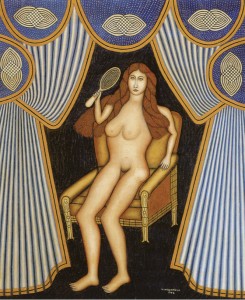Who’s There?
As part of this month’s DPP homework, we are asked to read and reflect on this poem by Stephen Batchelor:
Were mind and matter me,
I would come and go like them,
If I were something else,
They would say nothing about me.
What is mine
When there is no self?
Were self-centeredness eased,
I would not think of me and mine–
There would be no on there
To think them.
What is inside is me,
What is outside is mine–
When these thoughts end,
Compulsion stops,
Repetition ceases,
Freedom dawns.
Fixations spawn thoughts
That provoke compulsive acts–
Empiness stops fixations.
Buddhas speak of “self”
And also teach “no self”
And also say “there’s nothing
Which is either self or not.”
When things dissolve,
There’s nothing left to say.
The unborn and unceasing
Are already free.
Buddha said: “it is real,”
And “it is unreal,”
And “it is both real and unreal,”
And “it is neither one nor the other.”
It is all at ease,
Unfixatable by fixations,
Incommunicable,
Inconceivable,
Indivisible.
You are not the same as or different from
Conditions on which you depend;
You are neither severed from
Nor forever fused with them–
This is the deathless teaching
Of Buddhas who care for the world.
When buddhas don’t appear
And their followers are gone,
The wisdom of awakening
Burst forth by itself.
(image: “Seated Nude with Mirror,” by Morris Hirschfield)
The Fragrance of Virtue
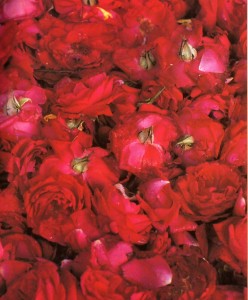 The perfume of sandalwood,
The perfume of sandalwood,
Rosebay or jasmine
Cannot travel against the wind.
But the fragrance of virtue
Travels even against the wind,
As far as the ends of the world.
Like garlands woven from a heap of flowers,
Fashion from your life as many good deeds.
–from the Dhammapada,
translated by Thomas Byrom
You Are Not Your Brain
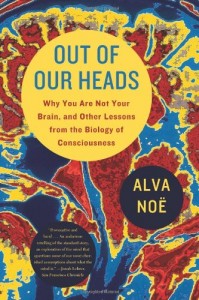 I’ve just finished reading Out of Our Heads: Why You Are Not Your Brain, and Other Lessons from the Biology of Consciousness. It’s a fascinating new book by Alva Noe, one of the contributors to NPR’s science blog: 13.7 Cosmos & Culture.
I’ve just finished reading Out of Our Heads: Why You Are Not Your Brain, and Other Lessons from the Biology of Consciousness. It’s a fascinating new book by Alva Noe, one of the contributors to NPR’s science blog: 13.7 Cosmos & Culture.
He doesn’t use the exact words, but it sure sounds like he’s talking about the Buddhist understandings of dependent origination and non-self when he describes consciousness as something that arises from the interconnectedness of our brain, our body, and the world.
Here’s what he says:
“We are out of our heads. We are in the world and of it. We are patterns of active engagement with fluid boundaries and changing components. We are distributed…
“The brain plays a starring role in the story, to be sure. But the brain’s job is not to ‘generate’ consciousness. Consciousness isn’t that kind of thing. It isn’t a thing at all….
“Brain, body, and world–each plays a critical role in making us the kind of being we are….
“If we are to understand consciousness–the fact that we think and feel and that a world shows up for us–we need to turn our backs on the orthodox assumption that consciousness is something that happens inside us, like digestion….
“Consciousness, like a work of improvisational music, is achieved in action, by us, thanks to our situation in and access to a world we know around us.”
Buen Camino
More from the Intro to the Guidebook of Maps for the Camino de Santiago, by John Brierley:
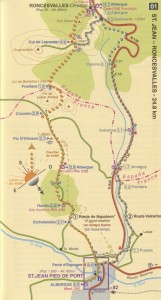 “We have been asleep a long time. Despite the chaotic world around us, or perhaps because of it, something is stirring us to awaken from our collective amnesia.
“We have been asleep a long time. Despite the chaotic world around us, or perhaps because of it, something is stirring us to awaken from our collective amnesia.
“A sign of this awakening is the number of people drawn to walk the camino. The hectic pace of modern life, experienced not only in our work but also our family and social lives, spins us ever outwards away from our center. We have allowed ourselves to be thrown onto the surface of our lives — mistaking busyness for aliveness, but this superficial existence is inherently unsatisfying.
“The camino offers us an opportunity to slow down and allow some spaciousness into our lives. In this quieter space we can reflect on the deeper significance of our lives and the reasons why we came…
“The camino encourages us to ask the perennial question — who am I? And, crucially, it provides time for answers to be understood and integrated.”
We Are What We Think
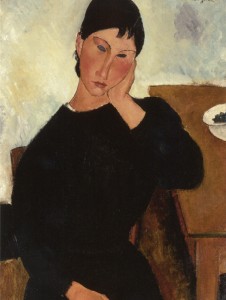 We are what we think.
We are what we think.
All that we are arises with our thoughts.
With our thoughts we make the world.
Speak or act with an impure mind
And trouble will follow you
As the wheel follows the ox that draws the cart.
We are what we think.
All that we are arises with our thoughts.
With our thoughts we make the world.
Speak or act with a pure mind
And happiness will follow you
As your shadow, unshakable.
How can a troubled mind
Understand the way?
Your worst enemy cannot harm you
As much as your own thoughts, unguarded.
But once mastered,
No one can help you as much,
Not even your father or your mother.
— from the Dhammapada, translated by Thomas Byrom
(image: Elvira Resting at a Table, by Amedeo Modigliani)
Breath and Body
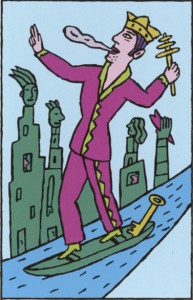 The Dancing with Life KM group meets tonight. The passage I chose for our discussion is from Chapter 15: When the Dance Ends, Freedom Begins.
The Dancing with Life KM group meets tonight. The passage I chose for our discussion is from Chapter 15: When the Dance Ends, Freedom Begins.
“Ajahn Chah used to say, ‘We focus on the here and now dharma. This is where we can let go of things and resolve our difficulties. We look at the present and see continuous arising and ceasing. When the mind starts to realize that all things without exception are by their very nature uncertain, the problems of grasping and attachment start to decrease and wither away….’
“To practice Ajahn Chah’s style of moment-to-moment awareness in daily life, when your mind is engaged in a specific task, you train it to automatically rest in awareness of breath and body sensations. Eventually breath and body awareness will become the ‘default’ position of your attention.
“Once you develop this ease of attention on the breath and body, you begin to note that every breath and every sensation ceases. At first, practicing noticing these endings may feel mechanical, but gradually a realization of wonder emerges: It is really true–everything that arises disappears! Such a moment of wonder is the direct experience of cessation.”
Phillip Moffitt says, “If you only develop one practice for cessation, this is the one I recommend.”
(image: Kitty Kahane Tarot)
Hello, Honey
OK, so this is not exactly Dharma….but what the heck.
 I belong to FareShares CCSA (Combined Community Supported Agriculture), which recently organized a fundraiser to help our local Marcoot Jersey Creamery buy a commercial cheese press. In return for my donation, I got a lot of very yummy garlic-and-chives cheese curds…AND the right to name one of their new baby cows!!!
I belong to FareShares CCSA (Combined Community Supported Agriculture), which recently organized a fundraiser to help our local Marcoot Jersey Creamery buy a commercial cheese press. In return for my donation, I got a lot of very yummy garlic-and-chives cheese curds…AND the right to name one of their new baby cows!!!
Here she is.
I named her Honey.
Isn’t she sweet!
How to be Happy
This from a talk by one of my teachers, Kate (Lila) Wheeler, featured in this month’s BSBC Insight Journal:
 “True happiness is the reward for doing things for their own sake, for the joy in being whole-hearted and present. So if we want ultimate liberation…and we also just want to be happier….being present when we’re doing something is critical.
“True happiness is the reward for doing things for their own sake, for the joy in being whole-hearted and present. So if we want ultimate liberation…and we also just want to be happier….being present when we’re doing something is critical.
“You may have heard about experiments in which they sent messages to people on their smart phones at random intervals asking how happy they were. Of 5,000 people involved, about 3,000 answered. They would ask them what they were doing, and to rate their happiness on a scale of 1 to 10. About 60 percent of people were totally distracted, and when distracted, the mind is not that happy.
“The upshot of the whole study would be: if, when you’re ironing a shirt, you are present and mindful, you will be happier than if you’re ironing a shirt and fantasizing about being in the Caribbean.”
Skeptical?
Check it out for yourself!
Waking Up
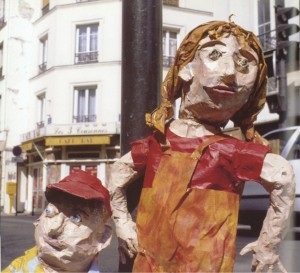 I was listening to another great talk by Jack Kornfield last night, this one titled: The Gates of Awakening, in which he quotes from Thomas Merton‘s famous “Fourth and Walnut” epiphany:
I was listening to another great talk by Jack Kornfield last night, this one titled: The Gates of Awakening, in which he quotes from Thomas Merton‘s famous “Fourth and Walnut” epiphany:
“In Louisville, at the corner of Fourth and Walnut, in the center of the shopping district, I was suddenly overwhelmed with the realization that I loved all of those people, that they were mine and I theirs, that we could not be alien to one another even though we were total strangers. It was like waking from a dream of separateness…..
“It was as if I suddenly saw the secret beauty of their hearts, the depths of their hearts where neither sin nor desire nor self-knowledge can reach, the core of their reality, the person that each one is in God’s eyes.
“If only they could all see themselves as they really are. If only we could see each other that way all the time. There would be no more war, no more hatred, no more cruelty, no more greed….I suppose the big problem would be that we would fall down and worship each other.”
(image: “A Whole World,” by Couprie and Louchard)
Sit with Jack in Cyberspace
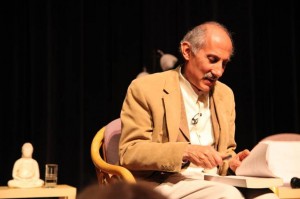 Sitting on retreat with Jack Kornfield is such an inspiring experience…but sadly not everyone can go to Spirit Rock, or Yucca Valley, or wherever Jack is teaching.
Sitting on retreat with Jack Kornfield is such an inspiring experience…but sadly not everyone can go to Spirit Rock, or Yucca Valley, or wherever Jack is teaching.
Until now!
Spirit Rock now offers LIVE webcasting at some of the more popular events, including Jack’s Introduction to Insight Meditation, on Saturday, April 13, 11 am to 7 pm St. Louis time (9 am to 5 pm PST).
This is a traditional Insight Meditation daylong retreat with instructions, silent sitting and walking meditation and dharma talk. Cost is $30. Do it, if you can. It will be so worth it. For more information and to register, click here.

